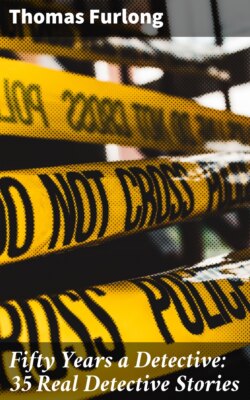Читать книгу Fifty Years a Detective: 35 Real Detective Stories - Thomas Furlong - Страница 4
SIDE-LIGHTS ON THE BUSINESS.
ОглавлениеELEMENTS NECESSARY TO MAKE A GOOD DETECTIVE.
HONESTY AND TENACITY VALUABLE ASSETS.
THE PROFESSION HAS ITS PARASITES.
All professions have their parasites and crooks. Among the lawyers you will find men who will commit a felony for a few paltry dollars to clear a client of a charge of petty larceny—providing he does not think there is a chance of his being caught.
Among the doctors you will find men (and they have diplomas with larger red seals on them than has the commission of the President of the United States) who make a specialty of committing illegal operations, and doing other things that are not considered either lawful or ethical.
Among bankers you will find men who every day violate both the laws of the state and the government—high finance, they call it.
The general public, however, knows and freely admits there are honest, upright, truthful lawyers, doctors and bankers, and highly honor each of these professions.
But the aforesaid general public is not so charitable to detectives. The pettifogging lawyers and irresponsible penny liners of the press have educated it up to believing that all detectives are thieves, thugs and black guards, just because there are some men in the business who make the peddling of family secrets and the working up of evidence in divorce cases a specialty. I could never quite understand why this state of affairs should be true, for I know many men of as good moral character and just as honest and upright in the detective business as I have found in any of the other professions.
Detectives are born, not made—that is the successful ones—just as are the successful lawyers or doctors or mechanics or merchants. Education does not always make a man a success in his chosen profession or calling. Unless he really possesses the peculiar make-up, or fitness, for what he chooses to make his life work, he will never reach the top round of the ladder of fame. Education, however, will help develop these necessary qualities, but that is all.
In addition to all these qualifications there are others which the detective must possess.
He must be scrupulously honest at all times, with himself and with those with whom he has dealings.
He must be sober, truthful and reliable, and, in addition, at all times and under all circumstances, a gentleman.
Tenacity and nerve are other valuable assets. A lazy man, or a coward, has no business in the ranks. And he must at all times be firm.
To my mind, a real detective should possess all the elements within his general make-up, which would be necessary to make him a success at any of the leading professions. He should possess the keen perceptive abilities of a trained or successful journalist, be able to read between the lines, as it were, or recognize the value of a clue, as the journalist does the value of a bit of news. He must be well posted on the law, especially that part pertaining to criminals. He must have the foresight and judgment of the successful merchant or tradesman. He must be sympathetic and just to the same degree as is the beloved pastor of a large congregation. And he must be an actor, one of the versatile kind of actors, who can play any kind of a part or assume any character without month's of rehearsing. He should at all times act natural, even while assuming a character, for if he overdoes the part he assumes, it is more than likely to attract unusual attention to him, which a real detective should avoid at all times.
Remember another thing: All crimes, nine hundred and ninety-nine out of every thousand, have a motive. True, these motives are often veiled and are not discernable at a mere glance. You must be a good diagnostician to handle these veiled cases—to diagnose them, as it were, as a learned physician diagnoses his case when called to the bedside of a very sick patient—find the cause. When you have found the motive for a crime, the balance of the work is usually easy.
There is one more phase of the detective business that I want to refer to briefly. Many men believe they were created or born for the express purpose of becoming detectors of crime. They believe they have missed their calling—it makes no difference by what means they are making a living now—because they have not been "called" into the detective business and many of them actually put in all their leisure time trying to "catch on" to a job, either in some municipal department or with some private agency. The truth is, not one in ten thousand of these men would "make good" if the opportunity to do so was offered them.
The chief of a detective agency does not go among these men who are laboring under the delusion that they have been "called," when he wants men to do real detective work. He selects his recruits from among acquaintances in whom he has recognized the talents necessary for the making of good thief-catchers or investigators. These are found in all professions and trades. Among the men in my employ can be found men who are capable of running the mechanical end of almost any kind of business, from a boiler shop to a composing room in a large printing house, or who could easily find, because of their qualifications, a good job in any large commercial or mercantile establishment.
In conclusion, I will add that after the natural qualifications for a good detective have developed themselves, it takes more hard work and study to reach the pinnacle of fame than other professions require, and the remuneration is a great deal less, taking into consideration the hazardousness of the business.
